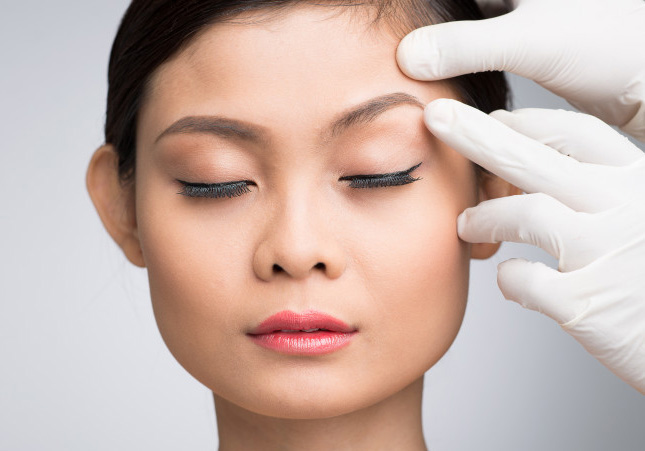Double eyelid surgery

How is an Asian eyelid different than a non-Asian eyelid?
There are several characteristics unique to an Asian eyelid. These include the eyelid crease, the amount and location of fat in the lid, and the presence of epicanthus.
- The eyelid crease: this is perhaps the single most important feature to discuss with patients desiring Asian blepharoplasty. Asian eyelids can have a well-defined eyelid crease that goes all the way across the eyelid, though it is often lower in position than on a non-Asian lid. For other patients, their eyelids may not have a crease at all! Still others may have a partial eyelid crease. And others still may have a crease in 1 eyelid, but not the other! In order to achieve the best results, during your consultation, Dr. Dewan will discuss the type of eyelid crease you have, as well as what you would like to have after the surgery.
- Eyelid fat: Asian eyelids typically have more fat that sits lower within the eyelid than non-Asian eyelids. In order to retain the “Asian” appearance of the lid, typically much less fat is removed or sculpted away from the lid than in non-Asian eyelids. Too much fat removal can “westernize” the lid, taking away one of the defining eyelid features of an Asian lid.
- Epicanthus: Many Asian patients have the unique feature of epicanthus, where the eyelid skin covers the inside corner of the eye. Asian patients may choose to have the epicanthus eliminated, or they may choose to retain the epicanthus when having Asian blepharoplasty. This can be a much more subtle change to your appearance.
What is the surgery like?
Most patients have surgery in our office. This method is performed using a local anesthetic with no sedation given. This makes for a quick recovery, and limits any sedation-related risk. Some patients may choose to do surgery in an operating facility under mild sedation. This sedative will relax you during your surgery and local anesthetic will also be used to numb your eyelids.
Prior to beginning surgery, Dr. Dewan will confirm the surgical plan with you. Once the surgery begins, Dr. Dewan will carefully place marks on your eyelids for surgery and then numb them using a local anesthetic. You may be asked to open and close your eyes a few times to ensure evenness during surgery, and then sutures will be placed to close the incision. Dr. Dewan will place a bandage over the incisions and you will have a post-operative visit 1 week after surgery.
Can multiple procedures be performed at once?
Absolutely! Many patients choose to address various concerns in the course of 1 surgery. Some of these additional procedures may include the following:
- Epicanthoplasty: this is the removal of the epicanthus as mentioned above.
- Lower eyelid blepharoplasty: many patients wish to have full eyelid rejuvenation with a quad blepharoplasty. This will address both the upper lids and the lower eyelid bags.
- Ptosis repair: if the eyelid is covering the pupil, patients may choose to have the lid lifted by addressing a slipped muscle.
- Brow elevation: brows are often lower as we age, making the eyelid appear even lower. Brow droop can also make us look angry or tired. Lifting the brows is a great way to improve this appearance.
- Eyelid lesion removal: small eyelid skin growths are exceptionally common and can be removed during eyelid surgery.
Is there scarring seen in the eyelid after surgery?
What is the recovery for Double Eyelid Surgery?
Before and After Double Eyelid Surgery


Will insurance pay for Asian Blepharoplasty?
Insurance companies have specific criteria for covering upper eyelid surgery. These criteria include specific eyelid measurements and documentation of vision blockage. A visual field test will be performed by Dr. Dewan to measure any blockage of vision. These findings are sent to your insurance company for approval following your consultation. If you meet their requirements, your insurance company will cover your operation. Typically, epicanthoplasty is not a covered procedure, and other cosmetic surgeries, such as lower eyelid blepharoplasty are not covered by insurance. Dr. Dewan is happy to provide a cost estimate for you regarding any surgery that may be cosmetic.
the best results.
